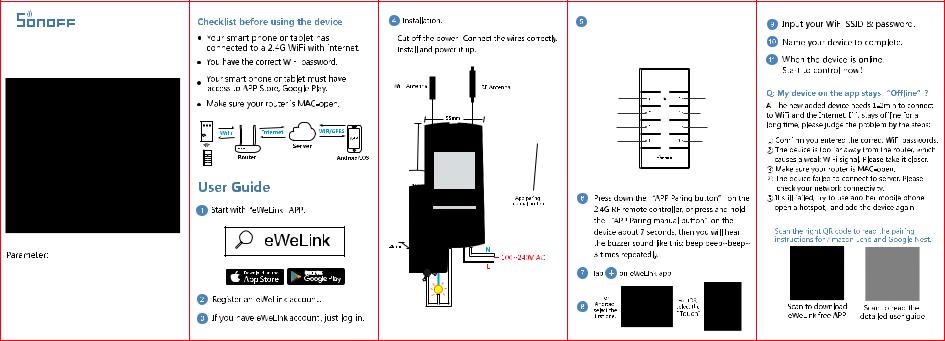Sonoff IFAN03 User Manual

Wi-Fi Fan&Light Controller




 iFan03
iFan03
433MHz remote control
Input: AC100-240V 50/60Hz 5A
Output: Light: AC100-240V 50/60Hz 3A
Tungsten lamp: 660W/220V Max
LED: 300W/220V Max
Fan: AC100-240V 50/60Hz 2A Max
Wi-Fi: IEEE 802.11 b/g/n 2.4GHz
RF remote control : 433.92MHz
Note: be sure to install protection devices (fuses or air switches) before connecting the live wire.
Power on after installing, then you can control the device via the matched 433MHz remote controller.
RF remote controller pairing: after powering on, the remote controller can be paired within 5s; if no operation within 5s, you need to power on again for pairing.
Light switch
High speed
Fan switch
RF clearing (long press)
Mute switch |
Medium speed |
Low speed |
Wi-Fi pairing |
(long press) |
FCC Warning
Any Changes or modifications not expressly approved by the party responsible for compliance could void the user’s authority to operate the equipment.
This device complies with part 15 of the FCC Rules. Operation is subject to the following two conditions:
(1) This device may not cause harmful interference, and (2) this device must accept any interference received, including interference that may cause undesired operation.
FCC Radiation Exposure Statement:
This equipment complies with FCC radiation exposure limits set forth for an uncontrolled environment. This equipment should be installed and operated with minimum distance 20cm between the radiator& your body.
This transmitter must not be co-located or operating in conjunction with any other antenna or transmitter.
Note: This equipment has been tested and found to comply with the limits for a Class B digital device, pursuant to part 15 of the FCC Rules. These limits are designed to provide reasonable protection against harmful interference in a residential installation. This equipment generates uses and can radiate radio frequency energy and, if not installed and used in accordance with the instructions, may cause harmful interference to radio communications. However, there is no guarantee that interference will not occur in a particular installation. If this equipment does cause harmful interference to radio or television reception, which can be determined by turning the equipment off and on, the user is encouraged to try to correct the interference by one or more of the following measures:
—Reorient or relocate the receiving antenna. —Increase the separation between the equipment
and receiver.
—Connect the equipment into an outlet on a circuit different from that to which the receiver is connected.
—Consult the dealer or an experienced radio/TV technician for help.
